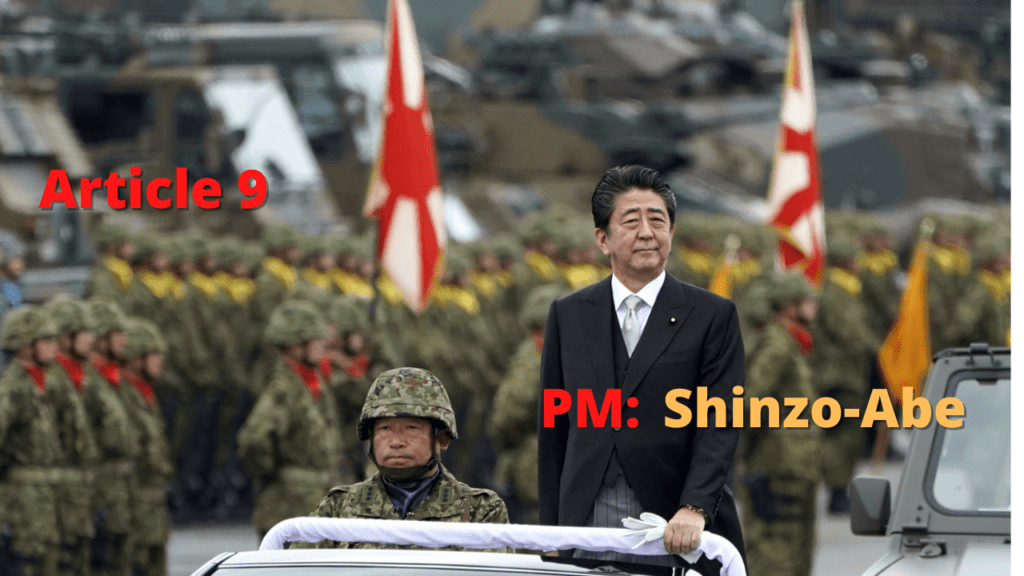Japan’s Constitutional Article 9, the debate over changes to the supreme law will be in full flow due to the supermajority that the four major political parties in the pro-constitutional reform camp control in both chambers of parliament and the absence of a general election for three years. These debates, meanwhile, are beset by numerous obstacles in Japan’s constitutional article 9.

Four Parties
The four parties continue to hold opposing views on several issues, including the main one of amending Article 9’s renunciation of war as well as less contentious ones like adding an emergency clause that would give the Cabinet more authority in the event of a major catastrophe or other emergencies like a pandemic.
Two-thirds of the seats are needed in both the Upper House and the House of Representatives for the ruling Liberal Democratic Party, its junior coalition partner Komeito, and two opposition parties, Nippon Ishin no Kai and the Democratic Party for the People, to propose a constitutional amendment.
Prime Minister Fumio
Prime Minister Fumio Kishida, the head of the LDP, declared immediately following the Upper House vote last month, “We’ll try to make a recommendation (on the constitutional modification) as soon as practicable.”
The main objectives of the LDP are to demerge the combined prefectural constituencies of the Upper House, add the emergency clause, clarify the role of the Self-Defense Forces in Article 9, and pursue educational reforms.
The LDP hopes to use the three years to reach an agreement on a draught of a revised Constitution because there won’t be a general election in Japan until 2025, barring the prime minister’s dissolution of the Lower House for an immediate election. This will allow for the first-ever proposal of a Constitutional amendment in parliament.
COVID-19 Pandemic
Because of the COVID-19 pandemic and the significant earthquake and tsunami that occurred in March 2011, the LDP thinks that establishing the emergency clause will be the most straightforward matter to settle with the other parties.
Japanese interpreter, The need to permit a special extension of legislators’ terms in the event of a major disaster has been acknowledged by the other three parties. But there is disagreement within the pro-reform camp regarding the introduction of emergency government ordinances that can be put into effect without parliamentary approval. While Komeito and the DPP are leery of the proposal, the LDP and Nippon Ishin are pushing for the emergency provision to include such ordinances.
When it comes to Article 9, the LDP has suggested keeping the first clause, which forbids war, and the second clause, which promises not to have the capacity to wage war and specifies the denial of the right to engage in hostilities, while providing a legal definition of the SDF. Nippon Ishin is behind this plan.
DPP
The DPP, on the other hand, thinks that Article 9 must be changed to make it clearer to what degree the right to self-defense can be used. On the other side, Komeito does not want to change Article 9 at all.
Although a demerger of the combined Upper House seats has been suggested, Komeito and Nippon Ishin are attempting to reposition prefectural constituencies into more substantial regional blocs.
Finally, Nippon Ishin is urging that free education be incorporate into the Constitution, but the LDP is not in favor of that idea. Kazuo Kitagawa, deputy leader of Komeito, stated that “we must attempt to find an accord incorporating various parties” about the discussions.
If the LDP wants to achieve the long-held objective of its former leader Shinzo Abe, there are a lot of obstacles to be overcome as a result of all of those arguments. At a party gathering on August 5, LDP lawmaker Keiji Furuya stated, “Working on (the constitutional change) is the finest method to console his spirit.”
However, conservative LDP members are concerned that after Abe’s passing, reform momentum would wane. The ruling camp would face intense opposition from the Constitutional Democratic Party of Japan, which was adamantly oppose to Abe’s proposals for constitutional revision if the party moves forward with amendments supported by the late former prime minister. Following a Cabinet shake-up on Wednesday, Kishida declared that he will place a high priority on developing a sustainable economy and society as well as establishing a new international order for the era that will follow the end of the Cold War.
He made no mention of constitutional reform being a top goal. A mid-level LDP member remarked, “I don’t think he’s truly willing to modify the Constitution.” For More News Click Here.
